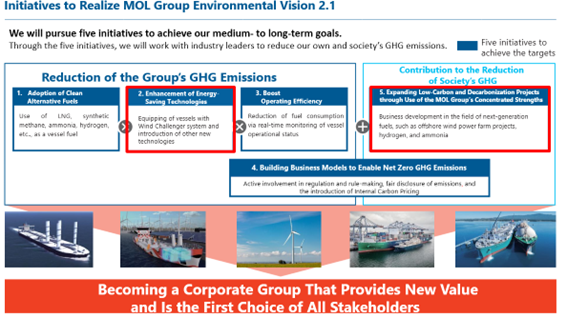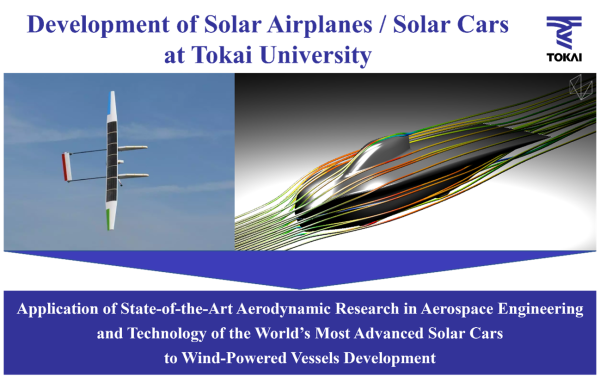Information
Four Companies Launch Study on Application of Aerospace Engineering Technology to Wind-Powered Vessels~ New Phase in Vessel Development Using Wind Power ~

August 4, 2022
Mitsui O.S.K. Lines, Ltd.
MOL Tech-Trade, Ltd.
Tokai University
Akishima Laboratories (Mitsui Zosen) Inc.
Four Companies Launch Study on Application of
Aerospace Engineering Technology to Wind-Powered Vessels
~ New Phase in Vessel Development Using Wind Power ~
Mitsui O.S.K. Lines, Ltd. (MOL; President & CEO: Takeshi Hashimoto), MOL Tech-Trade, Ltd. (MOLTT; President: Yoshikazu Kawagoe), Tokai University (President: Kiyoshi Yamada) and Akishima Laboratories (Mitsui Zosen) Inc. (President: Taiji Maeda) today announced an agreement to start a joint study related to wind powered propulsion of vessels by application of aerospace engineering technologies.
MOL, MOLTT, and Akishima Laboratories (Mitsui Zosen) have moved ahead with the adoption of their jointly developed “ISHIN ship design” (Note 1), which reduces greenhouse gas (GHG) emissions by using wind as propulsive force. Now they will implement more advanced joint development aimed at optimizing the hull shape for wind-powered vessels, which adopts aerospace engineering technologies in ISHIN ship design, in collaboration with Dr. Kota Fukuda, Associate Professor at the Department of Aeronautics and Astronautics, Tokai University, Japan.
Adoption of “ISHIN ship design” on the vessel can reduce GHG emissions by about 5% on the Asia-North America route, but targets a reduction of more than 12% by introducing aerodynamic technologies accumulated in the aerospace engineering field.
The MOL Group has set a target of achieving group-wide net zero emissions by 2050 in “MOL Group Environmental Vision 2.1.” It will proactively move ahead with technological development and social implementation to reduce GHG emissions from its vessels with concerted effort throughout the group, and meet customer and social needs to reduce the environmental impact of its business activities, thus contributing to the realization of a de-carbonized society. (Fig.1)
Dr. Kota Fukuda and his group have carried out fluid dynamics research on examination of flow phenomena around rockets and aircrafts, development of high-performance solar cars and solar unmanned airplanes, and further application of their own simulation technology to the medical field. Through this joint study, they will expand their research fields to ship engineering and ocean-going vessel development.
The study was selected for the Japan Ship Machinery and Equipment Association (JSMEA) “2022 new product development subsidy program”, and efforts are underway to commercialize the R&D results for the benefit of society with the subsidy from “The Nippon Foundation”.

(Fig.1)

(Fig.2)

(Note 1)
ISHIN ship design
This technology was jointly developed by three companies—MOL MOLTT, and Akishima Laboratories (Mitsui Zosen)—and earned patent and design registration. The hulls of these ships feature a shape that reduces wind pressure from both the bow and the sides. It uses lift from diagonally opposite winds, in addition to ensuring a smooth, streamlined flow of wind.
This design will be adopted on two cutting-edge LNG-powered ferries ordered by MOL.
February 17, 2022, press release:
MOL and MOL Ferry to Build 2 Cutting-edge LNG-powered Ferries – Introducing Super Eco Ferries Adopting Wind Power: Responding to Accelerating Modal Shift
(Note 2)
Dr. Kota Fukuda, Associate Professor at the department of Aeronautics and Astronautics, Tokai University
A noted researcher in fluid mechanics, aerodynamics and flow simulation fields, Dr. Fukuda has made outstanding achievements in aerospace engineering, automotive engineering, vortex dynamics, and so on. He is an expert in the area of fluid mechanics, aerodynamics, vortex dynamics, flow simulation, and unsteady flow phenomena. He received the PhD degree from Yokohama National University in 2005. He was a research associate at Yokohama National University, Japan, a faculty research assistant at University of Maryland, USA, a researcher at the Japan Aerospace Exploration Agency (JAXA)’s Engineering & Digital Innovation (JEDI) Center. He is now a director of the Tokai University Solar Car Team.
He is a member of the Japan Society for Aeronautical and Space Sciences (JSASS), the Japan Society of Mechanical Engineers (JSME), Society of Automotive Engineers of Japan, Inc. (JSAE, Member of the Technology Board, Chairman of the Computational Fluid Dynamics Committee, Aerodynamics Working Group Leader of the Vehicle Aerodynamics Committee), Japan Solar Energy Society (JSES), and the Japanese Rocket Society (JRS), and a senior member of the American Institute of Aeronautics and Astronautics (AIAA).
Kota Fukuda Laboratory: http://www.ea.u-tokai.ac.jp/fukuda
Department of Aeronautics and Astronautics (Aerospace Course), Tokai University: http://www.ea.u-tokai.ac.jp/
Tokai University Solar Car Team Facebook:https://www.facebook.com/tokaisolarcar
(Note 2)
MOL Group Environmental Vision 2.1
https://mol.disclosure.site/en/themes/101
